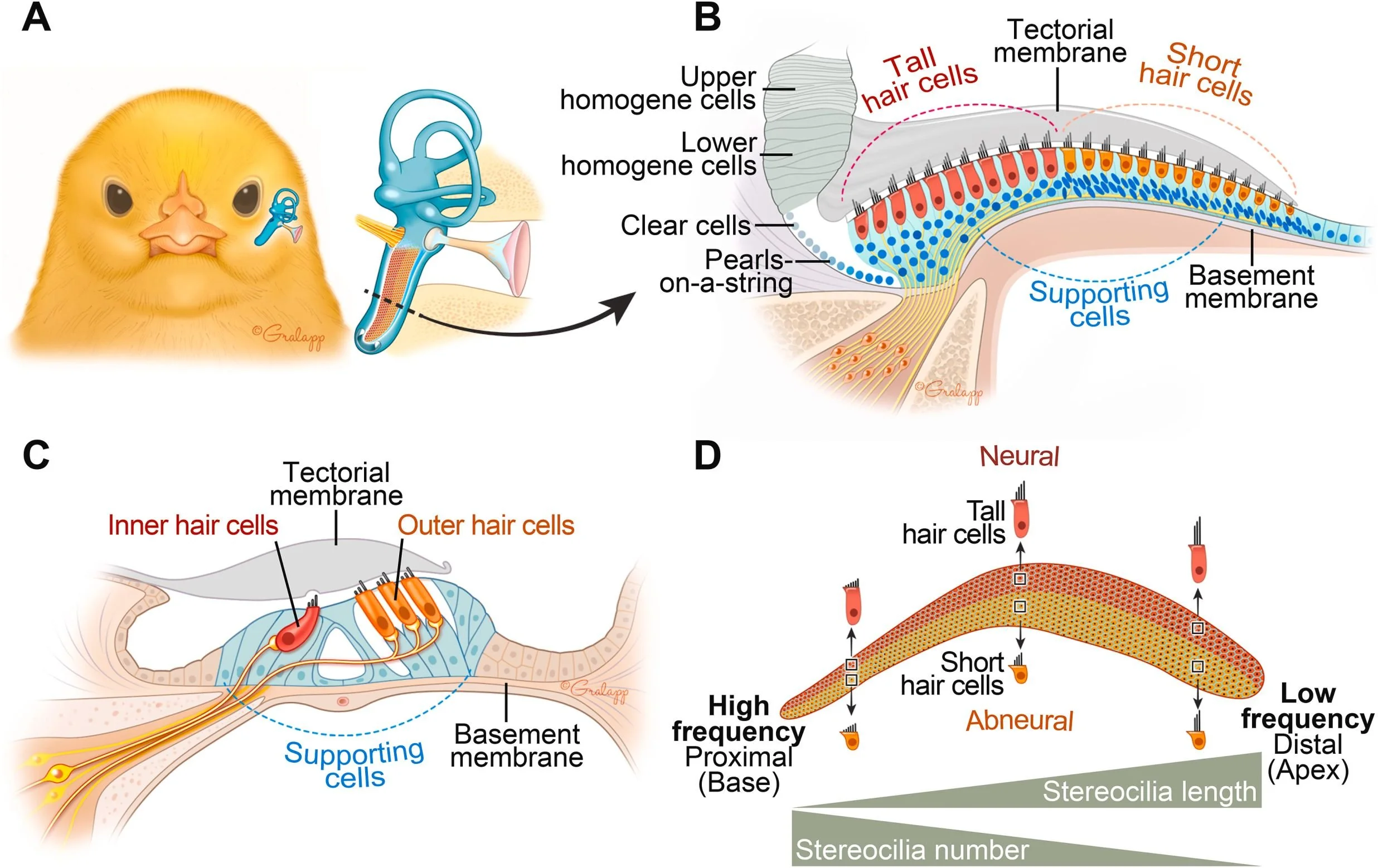Comparative anatomy of the avian basilar papilla (A and B) and mammalian cochlea (C and D). Credit: Miranda Portillo et al./Developmental Biology
Birds and fish can regenerate inner ear hair cells to restore hearing, but mammals cannot. The Hearing Restoration Project’s Stefan Heller, Ph.D., and team discovered that birds use two regeneration strategies: supporting cells either divide to create new hair cells or transform directly into hair cells. In mammals, this regeneration fails because supporting cells develop rigid structural components that physically block the process, and the molecular pathways that enable repair in birds are also blocked. The HRP is exploring ways overcome this through gene therapy and other methods.
Emerging Research Grants scientist Wei Sun, Ph.D., shows that a single variant in the Foxg1 gene can affect how the brain processes sounds and lead to a heightened sensitivity to noise. His 2024-2025 grant was generously funded by Hyperacusis Research, which also funded study coauthor Senthilvelan Manohar, Ph.D., in 2017.
In addition, 2022-2023 ERG scientist Megan Beers Wood, Ph.D., shares how she got her start with ERG, with generous funding again from Hyperacusis Research. Her story was on the cover of our Summer 2025 magazine. HHF is truly grateful for our long partnership with Hyperacusis Research.
Plus:
ADVERTISEMENT
Opinions Needed: Gene Therapy for Hereditary Hearing Loss
Do you have hearing loss or are you a parent of someone who does?
A graduate student at The Ohio State University is conducting a study on what individuals and families think about new gene therapy treatments for hearing loss. The anonymous survey takes ~15 to 20 minutes. Participants can enter to win 1 of 25 Amazon e-gift cards each worth $30.
Scan the QR code at left or visit this link to take the survey.
Questions? Contact connor.shemenski@osumc.edu.
Inviting family and friends to support HHF in honor of your birthday, anniversary, or a loved one is also a meaningful way to make an impact. You can also fundraise for HHF as your goal for a charity walk, run, or other events. Together, we can bring hope and hearing to millions. Learn more about fundraising to celebrate a milestone.
Around the Web:
My wife has profound hearing loss. What she likes (and doesn’t) about smart captioning glasses (PC Mag), hearing aid glasses are changing the hearing game (Next Avenue), and how to improve your AirPods listening experience if your hearing isn’t what it used to be (Media Nation)
A moment that changed me: on the day of my first book deal, a mysterious hum overcame me (The Guardian) and study looks at real-world sound exposure in people with and without tinnitus (Hearing Health & Technology Matters)
Assistive listening systems: what patients need to know (The Hearing Review), auditory acclimatization in new hearing aid users: practical insights for clinicians (The Hearing Journal), MarkeTrack 2025: hearing aids in the age of OTCs and wearables (The Hearing Review), and a cheat sheet of what people with hearing loss need from their audiologist (Canadian Audiologist)
Ear protection is the new sunscreen (Slate), why noise-induced hearing loss is a growing health threat & what to do (Mind Body Green), how noise affects our health (WHYY), the hearing loss generation is younger than you think (New York Post), and new study finds 80 percent of nightclub attendees experience tinnitus (EDM)
Dementia’s link with hearing loss may start sooner than we think (MedPage Today), a story based on the paper, “Self-reported hearing aid use and risk of incident dementia,” coauthored by HHF board member and ERG scientist Sharon Kujawa, Ph.D. (JAMA Neurology)
In navigating hearing loss, poet Raymond Antrobus explains his views on “deaf gain” (NPR) and my two-year-old’s hearing loss diagnosis shocked me; her doctor’s words saved me (The Guardian)
Products and services are not endorsed by Hearing Health Foundation. Links provided are for informational purposes only and may require registration or subscription. Links to time-sensitive events may expire.




